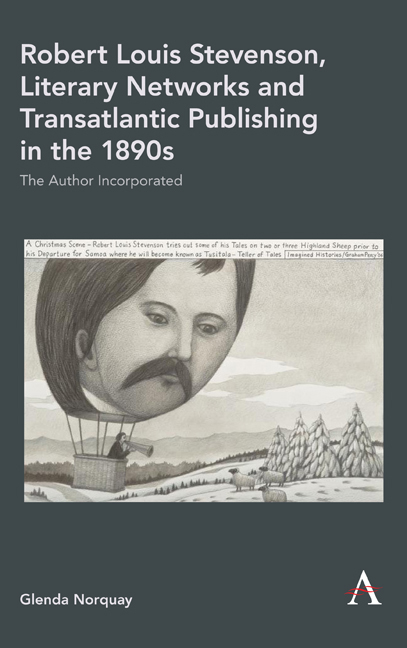 Robert Louis Stevenson, Literary Networks and Transatlantic Publishing in the 1890s
Robert Louis Stevenson, Literary Networks and Transatlantic Publishing in the 1890s Book contents
- Frontmatter
- Contents
- Acknowledgements
- Abbreviations
- Introduction
- 1 Lemuel Bangs: ‘The Senator’
- 2 A Tale of Two Texts
- 3 ‘A Gentleman Called Charles Baxter’
- 4 Sidney Colvin: Custodian and Monument
- 5 Family, Friends and Collaborators
- 6 Arthur Quiller-Couch: The Quivering Needle
- 7 Richard Le Gallienne: ‘Not While a Boy Still Whistles’
- Conclusion: Robert Louis Stevenson Incorporated
- References
- Index
6 - Arthur Quiller-Couch: The Quivering Needle
Published online by Cambridge University Press: 16 February 2020
- Frontmatter
- Contents
- Acknowledgements
- Abbreviations
- Introduction
- 1 Lemuel Bangs: ‘The Senator’
- 2 A Tale of Two Texts
- 3 ‘A Gentleman Called Charles Baxter’
- 4 Sidney Colvin: Custodian and Monument
- 5 Family, Friends and Collaborators
- 6 Arthur Quiller-Couch: The Quivering Needle
- 7 Richard Le Gallienne: ‘Not While a Boy Still Whistles’
- Conclusion: Robert Louis Stevenson Incorporated
- References
- Index
Summary
In a memorial tribute to Robert Louis Stevenson, published in the Speaker, and reprinted in Adventures in Criticism in 1896, Sir Arthur Quiller-Couch lamented that British writers no longer had someone to write for: ‘We always wrote our best for Stevenson.’ It is curious, he added, that ‘for five years the needle of literary endeavour in Great Britain has quivered towards a little island in the South Pacific, as to its magnetic pole’. Novelist, critic and educator, Quiller-Couch (or ‘Q’ as he was known from his publishing pseudonym) was one of those drawn to Stevenson and in a ‘magnetic’ relationship with him. Reading, as described by Wayne Koestenbaum, is ‘an engagement achieved through the imagination, across a distance; a tightly knit affair between a speaker and a listener; a survivor's gesture of reconnaissance and affection towards the past’. Cornishman Quiller-Couch had been an avid reader of Stevenson; he emulated him in his own fiction; he was identified by publishers as a source of similarly best-selling adventure fiction; he was second choice to conclude Stevenson's last novel. Completing the last six chapters of St Ives, he wrote as a reader in an act of prosthetic authorship at its most obvious. In later life Stevenson remained significant for Quiller-Couch; he incorporated the language of adventuring and Stevenson's interest in style into his own contributions to literary criticism and the formation of English Literature as a discipline.
Quiller-Couch's imaginative needle quivered towards the South Pacific, but in his own literary career he was drawn, like Stevenson, to the literary markets of the United States. Both sought to make their names in international, particularly transatlantic, contexts. Both writers had close relationships with Scribner’s, publishing books with them and writing for their Magazine. Both writers worked at real geographic distances from metropolitan and publishing centres, even if Quiller-Couch's residence in Cornwall offered a rather less extreme version of peripheral existence than Stevenson in Samoa. Like Stevenson, Quiller-Couch preoccupied himself with a particular geography: for him Cornwall offered a literary landscape, just as the most popular of Stevenson's fiction used Scotland as its imaginary. Their fiction shares an interest in the historical as well as the spatial. But the differences between them – in their literary networks, their relationship to institutional establishments and their engagement with literary trends – are significant.
- Type
- Chapter
- Information
- Robert Louis Stevenson, Literary Networks and Transatlantic Publishing in the 1890sThe Author Incorporated, pp. 161 - 186Publisher: Anthem PressPrint publication year: 2020


